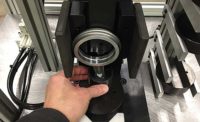Molding International and Engineering Inc. (MIE, Temecula, CA) is a medium-sized custom insert molding manufacturer. It serves the automotive, telecommunications, electronics and medical industries. Applications include high-precision insert molded components incorporating metal terminals and lead frames in material thicknesses ranging from 0.005 to 0.032 inch.
By the end of the 1990s, customer demand increased for products with tight tolerances and high quality. To produce insert molded connector housings for safety-critical automotive applications, MIE needed a way to load precision stamped terminal pins into the injection mold cavities. To minimize damage to the molds and inserts, consistent insert placement was critical. MIE also had to meet difficult molding cycles, place components within small tolerances and conduct 100 percent inspection. Additionally, the company wanted to reduce defects associated with repetitive manual operations.
MIE selected DENSO Robotics’ (Southfield, MI) six-axis VM 1000 robots. The robots are used in an insert molding workcell and interface directly with the molding press.
Prior to this time, MIE had not used flexible automation as part of its insert molding process. "The nature of the business was to continue with time-tested manufacturing processes, using custom automation on a limited basis [with] specific insert molded components," says David Hart, MIE’s engineering manager.
"The new DENSO robots offer a wide range of usage flexibility in programming for current projects and for those in the future," adds Hart. "The robots can be adapted to satisfy a wide variety of manufacturing challenges that are unique to insert molding. That was the key reason to go with all six-axis units. We wanted long-term flexibility for years to come."
The robots’ first job was to manufacture an insert molded connector housing, which used terminal pins having a 0.008-inch lead thickness. The traditional approach of loading these inserts into the mold manually was not practical, both from a quality and cycle time standpoint.
Since then, MIE has used the six-axis robotic workcell to manufacture nearly every insert molded part. When manufacturing insert molded connector housings for holding accelerometers in airbag deployment systems, the company now notes a significant improvement in part cleanliness, dimensional consistency and in-process yields. Defects normally associated with a manual process are nonexistent with robotics.
"The insert molded products manufactured at MIE are so rigid in their quality requirements that our best existing processes could not consistently meet the standards," says Hart.
Installing robotic workcells had multiple impacts on MIE’s business. It reduced the labor content required in each process, along with operator-related defects. In addition, molding process consistency has been greatly improved because of reduced shot-to-shot cycle time variation. That has been achieved by using a robot to load and unload the mold.
MIE also reduced small particulates, which are typically generated when the soft tin plating common on connector terminals contacts the hardened steel mold cavity. This occurs when injection molds are manually loaded and unloaded.
After deploying DENSO robots in its insert molding workcells, MIE has seen dramatic improvements in quality and increases in volume. Defects per million parts have been reduced by more than 150 percent. There is now a more consistent molding cycle. And the production lines are now operating more hours with fewer personnel.
Employee health and safety was another factor in the final decision to use robots. The risk of exposing MIE employees to repetitive motion injuries has been minimized even further, allowing staff to focus their energies on continuous process improvements and innovation.
For more information, on robotics call 888-476-2689 or visit www.densorobotics.com.


